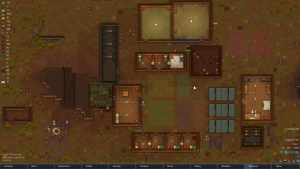Random Events: High Replay Value
During my ongoing literature review I often discover interesting facts about things I’ve never thought about. Sometimes I can connect these facts with my own observations: The result is mostly a completely new idea why things are as they are. Maybe these ideas are new to you, too. Therefore I’ll share my new science based knowledge with you!
This week: This time, I think about RimWorld’s random event system and general complexity that result in a high replay value of the game.
RimWorld, a colony simulation game, puts the players into control of a small group of colonists who survived a spaceship crash and stranded on the surface of a randomly generated planet. During the gameplay, a player is challenged to build a colony, produce food, research technologies and overcome a variety of random events, such as strong weather phenomena, pirate raids and solar flares that deactivate every electronical device. That way, every time the game is played, a user experiences a unique story and different challenges which results in a high replay value.

A RimWorld colony.
RimWorld is played from a bird’s perpective which provides players with a good overview and allows them to make strategic decisions. Normally, a player only gives meta-orders, such as placing markers where a new wall should be built, which are subsequently carried out by the colonists. However, in order to priotize certain activities, colonists can also be given individual tasks they complete before they resume with their regular activities.
Furthermore, RimWorld implements a high amount of variables, such as many character traits, a detailed health system and vast amount of clothes as well as other equipment, thus ultimately providing a very authentic gameplay experience [1]. For instance, colonists can suffer from various illnesses and wear a unique outfit depending on the season.
In sum, RimWorld achieves a very immersive gameplay as players can easily get attached to particular colonists and subsequently start to feel with them when they are in a dangerous situation or suffering from a severe illness. Also, due to the random event system, players often experience very dramatic moments like a short circuit that discharges every battery during an ongoing eclipse in the middle of the winter.
Personally, I am often wary when it comes to a high replay value as most games, despite being complex, rarely surprise me when I play them for a second time. RimWorld, however, has found the sweet spot between allowing me to develop a meta-strategy and surprising me with harsh events that lead to a high degree of drama and anxiety.
Recently, after having stopped playing the game for half-a-year, I began a new playthrough and I am once again as amazed and immersed as I was the first time I played the game. The reason for this comes mainly from the fact that RimWorld’s event system frequently sabotages my strategy and challenges me to adapt to a completely new situation. Moreover, as I have recreated the colonists that escaped the planet at the end of my first playthrough, I was already emotionally attached to them and skipped the phase of establishing a bonding.
As a conclusion, RimWorld’s random event generator, simulation of a large variety of different variables and general emotional aspects lead to a very immersive gameplay with a high replay value.